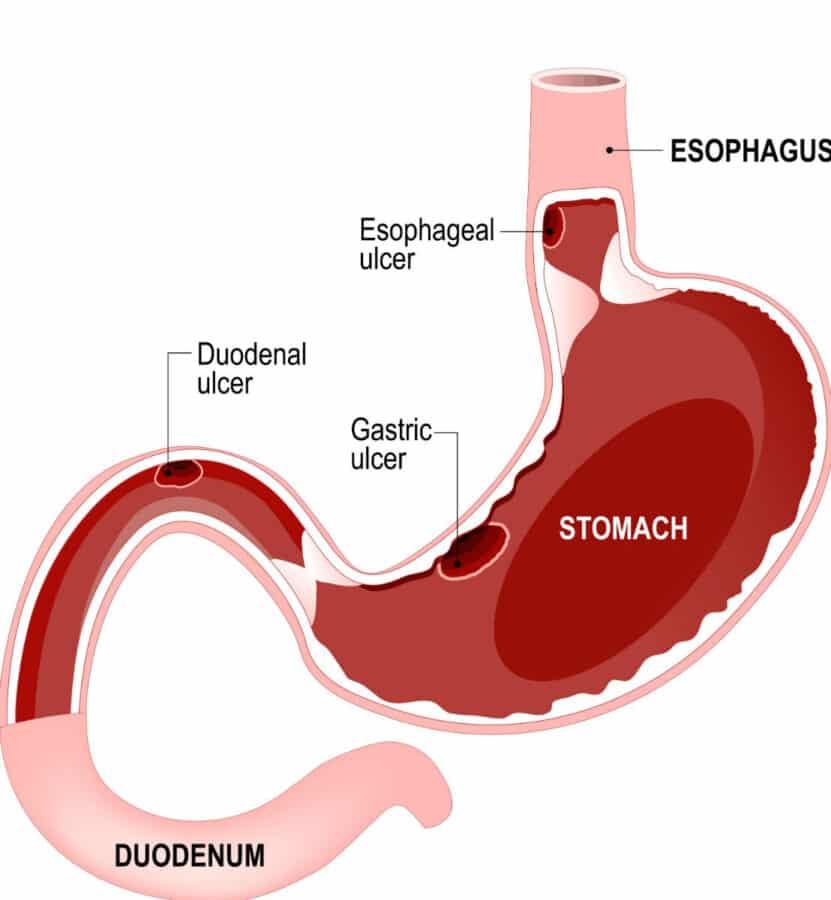Trouble sleeping at night is a common complaint among seniors. Whether it’s due to medications, poor sleep hygiene, health conditions or other issues, the result is the same—insomnia. Another common problem, especially for seniors 65 to 74 years old, is peptic ulcers. When both problems are chronic, there can be a connection.
What is a peptic ulcer?

A peptic ulcer is a sore inside your stomach’s lining or the upper part of your small intestine, also known as the duodenum. There are two types of peptic ulcer:
- Gastric ulcer, when the sore is located in the stomach.
- Duodenal ulcer, when the sore is located in the duodenum.
Ulcers may result in pain, heartburn, nausea, fatty-food intolerances and other ailments, although 75% of patients experience no symptoms at all.
Poor sleep can perpetuate a peptic ulcer
A bacteria called Helicobacter pylori, or H. pylori for short, causes someone’s initial peptic ulcer to form when it takes up residence in your gut. Modern-day treatments are very successful at eradicating the bacteria, and most patients who are found to have H. pylori and get treatment for it can say goodbye to their peptic ulcers for good.
Still, some peptic ulcers persist even after the H. pylori bacteria have been eradicated. A team of researchers in China set out to find why.
They took 1,689 patients with an H. pylori-infected ulcer and eradicated the bacteria through a 10-day course of anti-H. pylori treatment followed up with four weeks of anti-ulcer therapy. The 1,538 patients with no sign of the bacteria and completely healed peptic ulcers were enrolled in a sleep study. A total of 1,420 participants completed the study; the majority were 69 years old with normal body weight.
Those in the group who had their peptic ulcers come back had higher rates of chronic conditions like diabetes, heart disease and excessive alcohol consumption. They also took longer to fall asleep, had more night awakenings and self-rated their sleep as poorer than those who did not have an ulcer recurrence.
The researchers conducting the study concluded that treating sleep problems in seniors with previous H. pylori-infected peptic ulcers was vital to preventing recurrences.
Say “goodnight” to insomnia and “goodbye” to your peptic ulcer
The first stop for any treatment protocol is your doctor’s office. In the case of a peptic ulcer, the medical professional you’ll want to see is a geriatrician or a gastroenterologist.
“I recommend that patients start with their geriatrician or primary care doctor,” says Dr. Patrick Donovan of Heather Lane Physical Therapy in Denver. “A comprehensive geriatric assessment ensures the multidimensional evaluation of the patient. This evaluation best defines the clinical risk of adverse outcomes in the older patient with peptic ulcers and the ulcer’s side effects.”
To make the most of your doctor’s visit, be sure to bring a sleep diary on the previous week with notes on:
- Mealtimes
- Alcohol intake
- Caffeine intake
- Nicotine use
- Medication types, doses and times
- Stressors in your life
- Exercise routine
The role of physical therapy with peptic ulcers
Your physical therapist can be an additional resource for you. Talk to your PT about sleep quality and other concerns to rid yourself of peptic ulcers for good.
“The older we get, the more organ systems deviate from the norm,” Dr. Donovan explains. “Sleep quality, cholesterol, osteoporosis and cardiovascular disease all weigh differently in your comprehensive physical therapy evaluation.”
Heather Lane Physical Therapy completes a thorough physical assessment to create a customized rehabilitation program focused on optimizing performance, and that includes improving your sleep. Call the office at (720) 507-3962 or schedule your appointment online today.

